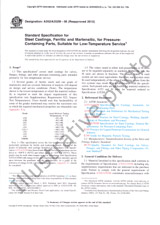We need your consent to use the individual data so that you can see information about your interests, among other things. Click "OK" to give your consent.
ASTM D6179-20
Standard Test Methods for Rough Handling of Unitized Loads and Large Shipping Cases and Crates
Translate name
STANDARD published on 1.10.2020
The information about the standard:
Designation standards: ASTM D6179-20
Publication date standards: 1.10.2020
SKU: NS-1007503
The number of pages: 6
Approximate weight : 18 g (0.04 lbs)
Country: American technical standard
Category: Technical standards ASTM
The category - similar standards:
Annotation of standard text ASTM D6179-20 :
Keywords:
drop, large shipping cases and crates, rolling, tip, tipover, unitized loads,, ICS Number Code 55.180.99 (Other standards related to freight distribution of goods)
Additional information
| Significance and Use | ||||||||||||||||||||||||
|
4.1 These test methods will allow the user to determine integrity and stability of the load as well as provide guidance to improve the design of the shipping container or the unit load where deficiencies are found. 4.2 Damage to products or packages observed during testing can be expected to correlate at least in a qualitative way to damage observed in actual distribution handling systems. 4.3 The results received from shock machine testing and free fall drop testing are different for certain products. Where this test is performed to satisfy a regulatory or contractual requirement, its use is subject to approval by the agency concerned. |
||||||||||||||||||||||||
| 1. Scope | ||||||||||||||||||||||||
|
1.1 These test methods cover testing the integrity of unitized loads and large shipping cases and crates as well as the ability of the contents to endure rough handling. Not all of the test methods are applicable to all products, containers, and loads. These test methods are applicable to common means of material handling as follows: 1.1.1 Test Method A, B, C, D, and E—Drop Test—For measuring the ability of the case or crate or unitized load to withstand rough handling impacts and provide information useful in improving the design of the container. Normally, Test Methods A and B are not applied to unitized loads. 1.1.2 Test Method F—Tip Test—For determining if filled tall or top heavy cases, crates, or unitized loads will tip over when tilted to a predetermined angle. 1.1.3 Method G—Tipover Test—For determining the ability of filled large shipping cases or crates to resist the impacts associated with tipover hazards, and for determining the ability of the packaging and packing methods to provide protection to the contents, when the case or crate is tipped over. Note 1: Test Method G fulfills the requirements of ISO 8768.
ISO 8768 may not meet the requirements for Test Method
G.
1.1.4 Test Method H—Rolling Test—For determining the ability of complete, filled large shipping cases or crates to withstand the effects of rolling. Note 2: Test Method H fulfills the requirements of ISO 2876.
ISO 2876 may not meet the requirements for Test Method
H.
1.2 Additional Test Procedures: 1.2.1 Test methods for mechanical handling of unitized loads and large shipping cases and crates are set forth in Test Method D6055. Additional tests that apply to mechanical handling of unitized loads and large cases and crates include incline impact tests, described in Test Method D880 and horizontal impact tests, described in Test Methods D4003 and Test Method D5277. Test Methods D4003 includes a special pallet marshaling test and Test Methods D1185 provides test methods for pallets and related structures. 1.2.2 Practice D4169 provides a series of options for selecting and running performance tests on all types of shipping containers and systems. 1.3 The values stated in inch-pound units are to be regarded as the standard. The SI units given in parentheses are for information only. 1.4 This standard does not purport to address all of the safety concerns, if any, associated with its use. It is the responsibility of the user of this standard to establish appropriate safety, health, and environmental practices and determine the applicability of regulatory limitations prior to use. 1.5 This international standard was developed in accordance with internationally recognized principles on standardization established in the Decision on Principles for the Development of International Standards, Guides and Recommendations issued by the World Trade Organization Technical Barriers to Trade (TBT) Committee. |
||||||||||||||||||||||||
| 2. Referenced Documents | ||||||||||||||||||||||||
|
We recommend:
Technical standards updating
Do you want to make sure you use only the valid technical standards?
We can offer you a solution which will provide you a monthly overview concerning the updating of standards which you use.
Would you like to know more? Look at this page.




 Cookies
Cookies
